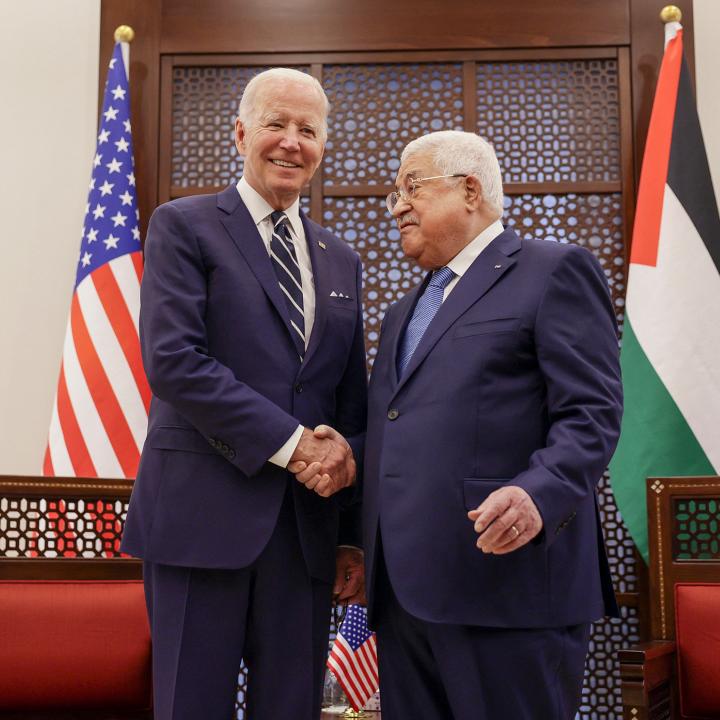
- Policy Analysis
- Fikra Forum
Reactions of Palestinian Media and Political Leaders to Biden’s Visit to the Region

Palestinians felt that Biden’s visit did little to aid the Palestinian cause, despite attempts by the Palestinian Authority to portray the trip as a success.
U.S. President Joe Biden began his trip to the Middle East by visiting Tel Aviv and Bethlehem, and reactions to the visit from Palestinian media and political leaders differed. With the exception of the Palestinian Authority and its media, most of the reactions to Biden’s visit were negative, claiming the trip added nothing to the Palestinian cause and instead only consolidated Israel’s interests and security. Palestinians were hoping that President Biden would fulfill his promise to reopen the U.S. consulate to Palestine in occupied East Jerusalem—a move that Israel vigorously opposes—after President Donald Trump closed it in 2019.
Given its diplomatic stagnation, the Palestinian Authority found an opportunity to reclaim its political footing at home and abroad in overstating the importance of Biden’s visit. In the same vein, the Palestinian Authority tried to exploit the visit by sending President Mahmoud Abbas on an international tour of several countries—most notably France and Saudi Arabia—in order to portray it in sympathetic media outlets as an unequaled diplomatic success for Abbas. Abbas even thanked Saudi royal leaders for “backing the two state solution” in a personal letter to King Salman and the Crown Prince following the Jeddah Summit.
Moreover, the Palestinian Authority’s official media addressed the visit and its dimensions at length in news reports and political analysis programs, focusing on the Biden administration’s lack of recognition of Jerusalem as the capital of Israel and the fact that there was no Israeli representative on hand during Biden’s visit to Jerusalem as an indication of the Biden administration’s earnest intention to reopen the Palestinian consulate in Jerusalem.
In this context, the spokesman for the Palestinian Authority, Nabil Abu Radina, commented on the visit, saying that it “carries many implications” and stressing that “Palestine is the first Arab country President Biden has visited since taking office.” Abu Radina’s statements reflect the strategy of the Palestinian Authority to represent the visit in the media and diplomatically as an emphasis on the centrality of the Palestinian cause within regional dynamics and current conflicts.
By contrast, Palestinian Liberation Organization (PLO) officials considered Biden’s visit a mere consolidation of Israel’s interests in the region. Wasel Abu Yousef, a member of the Executive Committee of the PLO, commented on the visit, saying, “no hope can be built on Biden’s visit to the region, as it provides more support for the occupation.” He added, “The visit was an attempt to make the occupier a part of the region in the framework of Washington’s hegemony, interests, and strategic partnership with Israel.”
Likewise, other Palestinian factions launched a harsh attack on the visit. The spokesman for Hamas, Hazem Qassem, declared that the visit was in the interests of Israel by providing additional support for its defensive measures. Qassem and Hamas-friendly media, in particular the Al-Aqsa channel and the Al-Resalah and Felesteen newspapers, found the visit to be counter to the Palestinian cause because it failed to adopt a clear and serious program for a political solution. The chief of Hamas’s political bureau, Ismail Haniyeh, launched a sharper attack on Biden’s visit, describing it as an attempt to entrench Washington’s bias toward Israel and stating that the “Jerusalem Declaration” document is an American attempt to engineer the region by integrating Israel into it.
The position of the Islamic Jihad Movement did not differ greatly from that of Hamas. Its Secretary-General, Ziyad al-Nakhalah, indicated that the solution lies in continuing military resistance against Israel as an occupying force. Similarly, media affiliated with Islamic Jihad, namely, the Istiqlal newspaper and the Al-Quds Al-Youm channel, also attacked the visit.
Besides the statements from Abu Yousef, various other PLO factions also weighed in on Biden’s trip. A statement from the Popular Front for the Liberation of Palestine (PFLP) described the visit as a new American step toward perpetuating “colonialist policies” against the Palestinian people. The same statement noted that the visit bore the features of U.S. support for an extension of the “Israeli colonialist” project beyond Palestine. In its statement, the Democratic Front for the Liberation of Palestine (DFLP) described the visit as an American project that seeks to liquidate what remains of the Palestinian cause, saying that the U.S. administration supports the Israeli move to squander riches and consolidate the pillars of a project that is causing the complete destruction of the region.
The Secretary-General of the Palestinian People’s Party (PPP), Bassam Al-Salhi, described the visit as an unprecedented step backwards in addressing the Palestinian issue, explaining that the visit was devoid of any real agenda for resolution and offered only “marginal” economic assistance to Palestinians, such as 4G cell service and moderate material support for certain service sectors, like hospitals.
In conclusion, the Palestinian Authority was the sole Palestinian actor that built on Biden’s visit to the Palestinian territories, while independent media not beholden to the Authority launched a harsh attack on the visit and its dimensions. However, the content of the diplomatic statements reflects two basic points. First, Biden’s visit did not actually accord with the aspirations of the Palestinian Authority. Instead, Mahmoud Abbas was essentially forced to make diplomatic visits in which he asked major countries, such as France, to intervene on Palestine’s behalf.
Second, it revealed that there is currently a lack of serious international interest in the Palestinian issue. Case in point, French President Emmanuel Macron merely stated that the Palestinians and Israelis need to negotiate directly and did not comment on the possibility of his country playing a role in mediating these negotiations. In response to this point, it should be noted that Paris had previously attempted to sponsor negotiations between the Palestinians and Israelis by holding the Paris Peace Conference in 2017, for example, but the conference did not create any resonance or acceptance from the Israelis at the time.
Usually, the United States assures that a comprehensive and just peace in the region will come only through a two-state solution. But such a solution requires more effort and serious intervention by the United States to hold effective discussions that could suspend the settlements and lead to an actual resolution of this issue. Although the United States has more recently made statements urging Israel to “review the rules of engagement” in the West Bank, especially after a steady escalation of violence in the past few months, Israel has continued to disregard them, all but writing the United States’ attempts at mediation off completely.


